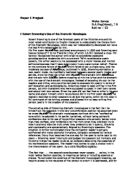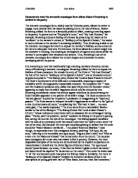The amusing side of Browning dramatic monologues is the fact the t he himself put the speakers in the very uncomfortable position he assumed when he wrote Pauline. His dramatic monologues continue with the "confessing" tone which he adopted in his earlier narratives, without being authentic confessions due to his use of hypocritical speakers who actually betray more than they confess, who incidentally tell the truth when they precisely try to hide it and who hide the truth when they pretend to tell it openly. Sincerity and spontaneity are systematically feigned by Browning’s speakers. The situation is further complicated since the competent reader is actually confronted with many authorial intrusions, obliquely conveyed by ironical references. Irony thus becomes the one way for the poet to come back to his poem – Browning never interrupts and judges his speakers but ironically and implicitly invites the reader to do so by obliquely debunking the speeches of his reprehensible speakers. The reader thus comes to play a pivotal role in the interpretation of the poem. As a critic Woolford explains:
‘The fact that . . . the second-consciousness never speaks. . . points, in the most radical fashion possible, to meaning as being or including absence or silence. To complete the construal of the dramatic monologue's meaning, we require access to the response of the person to whom it is addressed, and for whom its rhetorical manoeuvres are intended. In withholding that response Browning forces the reader himself to provide it, and thus compels him to hypostasize a meaning beyond the periphery of the persona's intention.’
Robert Langbaum saw the form as a continuation of an essentially Romantic "poetry of experience" in which the reader experiences a tension between sympathy and judgment. Glenn Everett contested this view with his own theory of ‘engagement, then detachment’ as he saw the role of the listener as one of discovery which engages the imagination, but the listener must remain detached and abstain from passing judgment until the work is known as a whole. Glenn Everett proposed that Browningesque dramatic monologue has three requirements:
- The reader takes the part of the silent listener.
- The speaker uses a case-making, argumentative tone.
- We complete the dramatic scene from within, by means of inference and imagination.
Two unique and differing examples of Browning’s dramatic monologues are found in his poems Fra Lippo Lippi and Andrea del Sarto.
In Fra Lippo Lippi we come to know - almost intimately - one of the great painters of his of the Renaissance as he is imagined by the poet: we learn about his escapades, his introduction into a religious order, and his ideas on art all of this through what Fra Lippo and beauty and religion. We learn Lippi says to the captain of the guard who has seized him returning to the house of Medici (where he was supposed to be painting) after a night of revelry. Andrea del Sarto reveals his strengths and weaknesses as man and painter during a "conversation" with his beautiful but faithless wife, Lucrezia. As the Poem unfolds, we learn not only about Andrea but about his wife and the highly complex and fascinating relationship between them.
Fra Lippo Lippi has always been one of the best known and most famous poems of Browning, for several reasons. It is arguably a paradigm of dramatic monologue, with a speaker identified in the title, and an interlocutor identified in his social relationship to the speaker. The poem contains some of Browning's favourite motifs: Renaissance Italy and Italian painters, love, and, above all, the conditions of the artistic creation. Orality, in terms of sound and rhetorical mannerisms characterize Browning’s dramatic monologues and this is especially true of both Fra Lippo Lippi and Andrea del Sarto. Brother Lippo's monologue is actually a monopolylogue, that is to say a one man show. He impersonates in turn the voices - as well as the faces, we are led to believe - of a series of characters from the convent: a fat monk, the Prior, various other monks amazed at his talent, the head of the watch and even himself. Dramatic monologues usually integrate the props and the setting in the speaker's words. In Fra Lippo Lippi, we come to know that the place is a narrow, almost closed space: "an alley's end". The name of the historical main character gives us a clue to the time, and there is no need to add a subtitle as it occurs in "Pictor Ignotus", "Florence, 15- ". Several places are mentioned: Cosimo de Medici's house, the door of a nearby house. On a larger geographic scale, Florence and Italy make up the frame of the poem. Italy, first, in the title, and thanks to the onomastics (Cosimo de Medici, Old Aunt Lapaccia, the Camaldolese monks) combined with the names of famous artists like Giotto, Fra Angelico, Lorenzo Monaco, Masaccio (alluded to as " Hulking Tom "). Far from being fastidious name-dropping on Lippo's part, these references made in passing belong to the daily background and occupations of the characters. The same goes for the cultural aspects: carnival time and its festivities, the Florentine magistrates, Chianti evoked in an apparently spontaneous metaphor. Similarly, in Andrea del Sarto lines such as "And look a half-hour forth on Fiesole","Who listened to the Legate's talk last week" give us a clue as to the historical and geographical location of the poem. Browning organizes around his speakers a solid network of metaphors and cultural traits whose function - if not aim - is to legitimize the words of the speaker, and consequently their realistic quality. Thus in Lippo's mouth the word "villa" takes up its Italian origin. Furthermore, characters are fleshed out thanks to interwoven intertextual references. The main external intertextuality of Fra Lippo Lippi is the Bible - which is in accordance with the speaker. A striking phenomenon at work in some dramatic monologues is the following: the characters seem more spoken than speaking, possessed as they appear to be by their desires. Thus Lippo, obsessed by corporeity, describes the gesture of a soldier with the phrase: "elbowing on his comrade", instead of "nudging". The asides are part and parcel of Lippo's rhetoric, which tends to debunk religion.
Fra Lippo Lippi takes the form of blank verse - unrhymed lines, most of which fall roughly into iambic pentameter. As in much of his other poetry, Browning seeks to capture colloquial speech, and in many parts of the poem he succeeds admirably: Lippo includes outbursts, bits of songs, and other odds and ends in his rant. In his way Browning brilliantly captures the feel of a late-night, drunken encounter.
Andrea del Sarto unrolls in pentameter blank verse, mostly iambic. It is a quiet poem, the musings of a defeated man. Both in language and in form it is modest and calm. Yet it also manages to mimic natural speech quite effectively, with little interjections and asides. While this monologue comes across as dramatic in nature, it does not dramatize anyone's actions. Rather, it seeks to capture a mood and an attitude. In this way it has more in common with Tennyson's dramatic monologues (such as Ulysses) than it does with other poems of Browning's.







